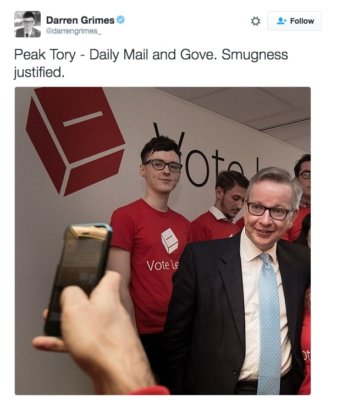- About
- Topics
- Picks
- Audio
- Story
- In-Depth
- Opinion
- News
- Donate
-
Signup for our newsletterOur Editors' Best Picks.Send
Read, Debate: Engage.

| located: | United Kingdom |
|---|---|
| editor: | Shira Jeczmien |
Recollecting the early hours of the morning, a British June-like sunrise, due trickling down my single glazed window, and the map of the United Kingdom dotted with patches of blue and yellow – each indicating the Leave and Remain zones. As the minutes passed the Leave’s blue territories began to leak, dribble down my naive optimism for a united future; for a world where we collectively work to find more of our commonalities, not differences. Indeed that was the morning of Brexit, a brash and uncalculated move that, over a year later, has shown no clarity nor justification for its reasoning.
And in an appropriate manner for our times, this week has brought with it yet another investigation into the misallocation of funds for the Vote Leave campaign, led by England’s very own International Secretary Boris Johnson and former UKIP leader Nigel Farage.
What has been uncovered in recent days, and is currently undergoing further investigation is the breach of the Leave Vote campaign’s £7 million EU referendum spending limit. The Electoral Commission’s Vote Leave returns show that 40% of the £6.8 million campaign total cost was paid to a rather obscure if not random Canadian digital agency called AggregateIQ. But, in today’s age of social media persuasion, Russian bots, millions of dollars spent on targeted ads and the general ‘fake news’ epidemic, the intervention of an ‘underground’ digital agency that helped push Brits across the nation to blindly vote for an unknown future, filled with crooked politicians and fake promises, doesn’t come a huge shock. What is peculiar in this narrative is the inclusion of Darren Grimes.
It’s been exposed that during the campaign approximately £625,000 was donated to Grimes, then a 24 year old fashion student who was running his own pro Brexit campaign under the title of BeLeave – he was also closely associated with the Vote Leave campaign, spending time in its HQ and even being photographed with Michael Gove (the conservative Secretary of State for Environment, Food and Rural Affairs who also played a major role in leading the campaign). It’s also suspected that Vote Leave transferred another £100,000 to AggregateIQ in a similar indirect form – passing its budget far over the spending limit.
Jolyon Maugham QC, barrister and director of the Good Law Project – the law firm that pushed the Electoral Commission to open and reopen the investigation – said “It’s not just about Brexit. The reason we have spending limits is because we want to live in a democracy, not a plutocracy.” Something many of us struggle to recognise within the blurry chaos of investigations looming over our world leaders. “We want all the people to have the power, not just the rich ones. And the Electoral Commission’s job is to protect our democracy: to police those limits, carefully, sentiently, vigorously, without fear or favour.”
Whether or not this will affect the Brexit vote’s legitimacy is anyone’s guess. But as Maugham said, this isn’t even about Brexit.